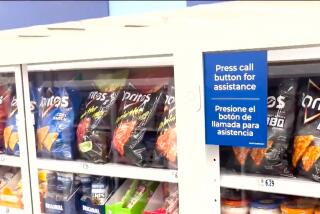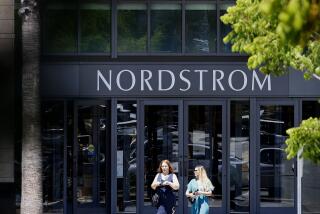When Employees Steal : Thefts can mean the difference between profit and loss.
John Mullin, president of Mullin Lumber Co. in Los Angeles, knew he was being ripped off, but he couldnât figure out how.
âWe didnât know if it was employee theft, customer theft or the mishandling of the books,â recalled Mullin. He began questioning employees about the substantial losses. At first, he said, he believed their denials.
But when the thefts continued, an exasperated Mullin finally called Ray Boyd, president of Boyd & Associates. Boydâs North Hollywood-based security firm had already provided alarm systems and security guards for Mullinâs lumberyard on West Slauson Avenue.
Boydâs investigation revealed four employees who confessed to stealing cash from the register as well as merchandise.
âOne young girl working as a cashier took no less than $17,000,â Mullin said. âEvery Thursday, when her drug dealer came by, she handed him a bunch of $20 bills.â
To cover the missing cash, Mullin said she would make up credit returns and mis-rings on the register. Mullin turned his dishonest employees over to the district attorneyâs office for prosecution. And he posted notices of all their court appearances and convictions as a deterrent to others on his staff.
Not every small business is so openly robbed, but many companies find themselves plagued with troublesome thefts and breaches of security. Employee thefts can mean the difference between profits and losses, especially for a small business, Boyd said.
âFor every dollar a shoplifter takes, employees take $6,â said Boyd, a former Boston police officer and security director for a major airline. Boyd and his 400 employees provide alarm systems, patrol cars, security guard services and investigators. The company also interviews prospective employees for its clients in an attempt to spot potential troublemakers.
âCrime is Contagiousâ
After more than 20 years in the security business, Boyd believes that a companyâs security and integrity begins at the top.
âIf you treat your products casually, employees will do the same thing,â he said.
For example, if the president or owner takes home tools, equipment or office supplies, then the message to employees is that it is all right for them to do the same thing.
âCrime is contagious,â Boyd said. He said the âRobin Hood syndromeâ also permeates a business when employees believe that it is OK to steal from the ârichâ company owner.
Even when small-business owners know that someone is stealing from them, Boyd said, most are reluctant to confront employees about suspected thefts.
âIf everybody would have the guts to say, âExcuse me, where are you going with that box?â they wouldnât need me,â Boyd said.
Through the years, Boyd has encountered a wide variety of security problems. A few years ago, a toy company hired him to stem its internal losses. The first thing he did was collect all the toys sitting on employeesâ desks as decorations. He took the toys to the president and told him that decorating desks with toys meant that it was OK to take toys from the manufacturing area--when it really wasnât.
Another time, a major record company hired Boyd to figure out who was stealing records. He discovered that while executives were permitted to take home a certain number of records each month, other employees were not. This created a feeling of resentment among employees and gave them a justification to steal.
To solve the problem, Boyd suggested that the company sell employees its extra or slightly defective records for 25 cents each. This tactic dramatically cut down on the pilfering, he said.
Even though most small-business owners are too busy running their business to be concerned about security until a problem arises, Boyd said it is essential to conduct a security audit at least once a year.
âPrevention is cheaper than apprehension,â Boyd said.
SECURITY AUDIT TIPS
Check lights, locks and fences: No matter what kind of business you operate, having the right kind of outdoor lighting, locks and fences is the first step toward better security.
Monitor deliveries and shipments: If you ship goods, monitor loading dock workers and delivery drivers by making surprise checks at different times each day. With the shipment order in hand, count boxes or crates as they are loaded. Boyd also suggests adding extra boxes sometimes to daily shipments to see if the extras are returned at the end of the day. When a delivery is made, be sure to check every box or package before signing the receipt.
Monitor purchases: Periodically ask friends to drop by and make purchases. Then check to see if the clerk rings up the order accurately and provides a correct receipt.
Monitor mail payments: To prevent checks from disappearing, make sure that the person who opens the mail is not the same one who makes bank deposits. Boyd suggests that the mail opener run a tab on the total amount of the checks and give the owner a copy. Then the checks and the list should be turned over to a controller or bookkeeper for deposit.
More to Read
Inside the business of entertainment
The Wide Shot brings you news, analysis and insights on everything from streaming wars to production â and what it all means for the future.
You may occasionally receive promotional content from the Los Angeles Times.










